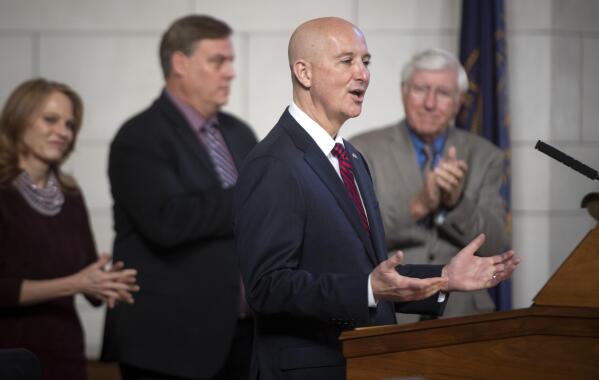Nebraska’s Ricketts seeks tax cut for highest earners
LINCOLN, Neb. (AP) — Nebraska Gov. Pete Ricketts proposed an income tax cut on Thursday for corporations and nearly 419,000 residents whose incomes rise into the state’s top bracket.
The Republican governor said he would seek to lower the top rates to 5.84%, down from the current 6.84% for individuals and 7.25% for corporations that are set to take effect next year.
The plan would reduce state tax collections by $178.8 million by fiscal year 2025. Like many other states, Nebraska is flush with cash from a better-than-expected pandemic economy and billions in federal stimulus payments that went to most Nebraska taxpayers.
“I was elected on the promise that I would bring tax relief to our state,” Ricketts said in his annual State of the State address, his final one before he leaves office next year. “It’s what the hardworking men and women of our state deserve. And, given our current financial situation, we must deliver.”
Ricketts also tried to preemptively address a common criticism that cutting the top rate benefits the wealthy, an argument that has thwarted similar plans in past years. Nebraska’s top rates kick in at just over $32,000 for individuals and $64,000 for married couples filing jointly, although many taxpayers reduce their taxable income below those levels through credits and deductions.
“For those who may try to brand this as a tax cut for the rich, I challenge you to ask Nebraskans earning $33,180 a year, or families earning $66,360 a year, if they feel rich,” he said. “They make up the 418,900 Nebraskans in this tax bracket who deserve relief.”
In fact, they make up only the lowest earning Nebraskans in the highest tax bracket. Under Ricketts’ plan, a single person with a taxable income of $40,000 would save less than $80, while someone with $1 million in taxable income would save nearly $10,000.
“The fact is the tax cuts the governor discussed today, including those on Social Security income, are heavily skewed toward the wealthy,” said Rebecca Firestone, executive director of OpenSky Policy Institute, which generally opposes such policies. “They would leave the state vulnerable to cuts to real economy builders like schools and health care when the federal dollars currently bolstering our economy stop flowing.”
Many Nebraska business groups have said income tax rates are one factor that companies consider when deciding where to open, although they acknowledge that businesses also look at the availability of workers in an area, the quality of life and other factors. They argued that lowering the rates would benefit employees as well, allowing them to keep more of their earnings.
“On a collective level, you have more money going into their pockets that’s being reinvested in goods and services,” said Jim Smith, who leads a pro-industry initiative called Blueprint Nebraska. “That’s where growth then occurs, and you have an expansion of the economy.”
Supporters have also said that lowering corporate income taxes would bring some companies in line with the rate paid by smaller businesses, which are often set up to pay taxes as individuals rather than corporations.
In neighboring Iowa, Republican Gov. Kim Reynolds announced a tax cut plan of her own on Wednesday that would impose a flat 4% tax at an estimated cost of $1.58 billion. Some critics have argued that states are only able to cut taxes because of the economic boost provided by federal pandemic aid.
Ricketts also threw his support behind a bill that would speed up the phase-in of a Social Security tax exemption that was approved last year, implementing it in five years instead of 10.
Ricketts also urged lawmakers to adopt his proposals to build a new state prison to replace the Nebraska State Penitentiary in Lincoln, to build a canal and reservoir system to preserve Nebraska’s water supply, and a state budget with 1.5% average yearly growth.
Ricketts laid out his plans for more than $1 billion in federal pandemic stimulus aid, which is separate from the state’s general fund. His plan calls for nearly $200 million to go toward public health services and $500 million to go toward addressing the pandemic’s negative affects on the economy, including assistance for economic development projects in north Omaha, and money for low-income parents and Nebraska’s community colleges.
___
Follow Grant Schulte on Twitter: https://twitter.com/GrantSchulte




